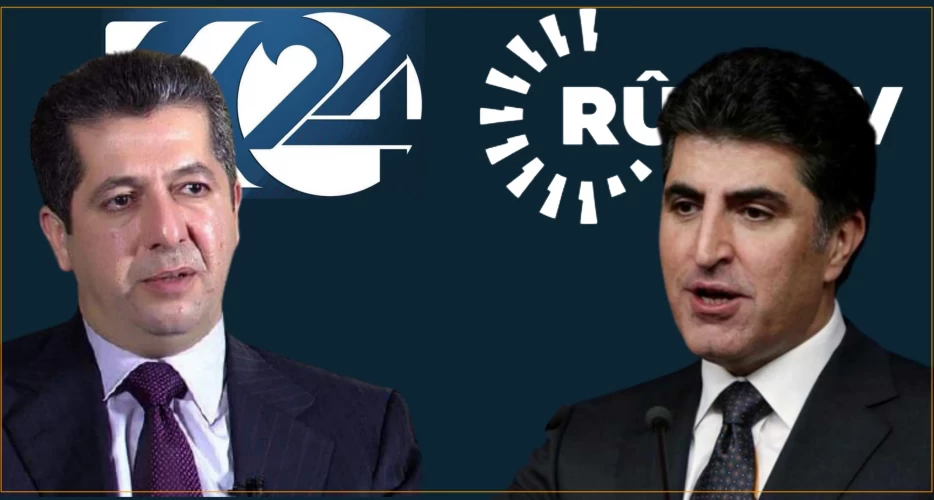Tension between Kurdistan Region’s president, premier puts media freedom on the line

Peregraf- Surkew Mohammed
Tension heightened between the Kurdistan Region’s president and premier, putting press freedom on the line when Rudaw Media Network owned by the president was barred from holding interviews with ministers and senior government officials and was denied free access to information.
"Government officials have not been giving us statements for nearly two months," journalists from Rudaw Media Network confirmed to Peregraf on the condition of anonymity.
"On the one hand, the channel's programs have been struggling because government officials are not ready to be hosted and interviewed, and on the other hand, the news section struggles with the lack of information and statements to our reporters," they added.
This dispute between the two cousins, namely President Nechirvan Barzani and Prime Minister Masrour Barzani, transpired when the latter succeeded the former as prime minister and formed the ninth cabinet of the government.
Masrour Barzani always made sure to blame mistakes, shortcomings, and piled-up corruption from the previous cabinet for existing problems, indirectly calling out his cousin Nechirvan Barzani, who was the prime minister of Kurdistan Region for 16 years before he became the president.
The Kurdistan Region has been entangled in a severe financial crisis and complicated problems with the federal government in Baghdad for eight years.
Masrour Barzani's cabinet has criticized that the Rudaw TV channel in their reports holds the current cabinet responsible for these problems and doesn’t raise issues of the past.
Earlier in January, the Kurdistan Regional Government’s (KRG) Coordinator Office for International Advocacy, Dindar Zebari, ironically banned NRT media, owned by opposition politician Shaswar Abdulwahid, and Rudaw Media Network from attending his press conference about human rights and freedom.
"The KRG wants to be a role model for freedom in the region," Zebari said at the conference.
One Peregraf reporter who was present at the presser asked him under what legal grounds does the government discriminate between media channels and bans them from participating in public pressers, he replied, "The KRG is free to choose which channel to invite and talk to at their press conferences, and the channels are free to file complaints against the government."
Article 7 in the Press Law of 2007 includes that "journalists have the right to attend public conferences and activities."
Kurdish media are either party-affiliated or controlled by certain politicians. Independent media don’t exceed five in numbers, there is especially no independent TV channel.
Getting interviews and information is a major struggle for the few independents standing. Peregraf has multiple times contacted the KRG spokesperson Jotiar Adil for comments on different topics, but he was never available for comment.
Adil was satirically called the spokesperson for Rudaw and Kurdistan24 (K24) channels by Kurdish journalists. However, he has now boycotted Rudaw as well and only speaks to Masrour’s K24.
The new cabinet - Two different directions and instability
Although the current cabinet claims to be better than the previous one in terms of freedom, human rights, and fighting corruption, the reality says otherwise.
Parliamentarians and the region’s Integrity Committee say some situations have worsened. For example, smuggling at the border crossings.
In terms of journalists' rights and media freedom, Masrour Barzani’s government has proven a worse example than previous cabinets. It has received strong criticism from international countries and organizations following the arrest of dozens of activists and journalists from Duhok.
The current government has also been unable to properly distribute salaries. Employees have gone on strikes and protests multiple times.
In his latest presser on March 3, Masrour Barzani once again criticized the policies of former cabinets, particularly for its oil management which is the region's main source of income.
He explained that according to previous contracts signed with companies, only 41% of the oil revenues remain for the government to pay salaries, the rest goes to the oil companies, oil transportation, and repaying debts.
"No contract was signed during this cabinet, all were signed before," he said.
The two cousins also attended the Munich Security Conference last month with two different delegations.
Unlike before, their media channels did not report each other's meetings at the conference, except for the two meetings they held together with the United Nations and an American delegation.
Nechirvan Barzani and Masrour Barzani each have strong economies, media, and armed forces of their own. If this tension continues to trickle down, it is likely it wi lead to a dangerous brew of political turmoil and insecurity, worse than what the region saw between the two cousins from Sulaimaniyah’s ruling parties last year.